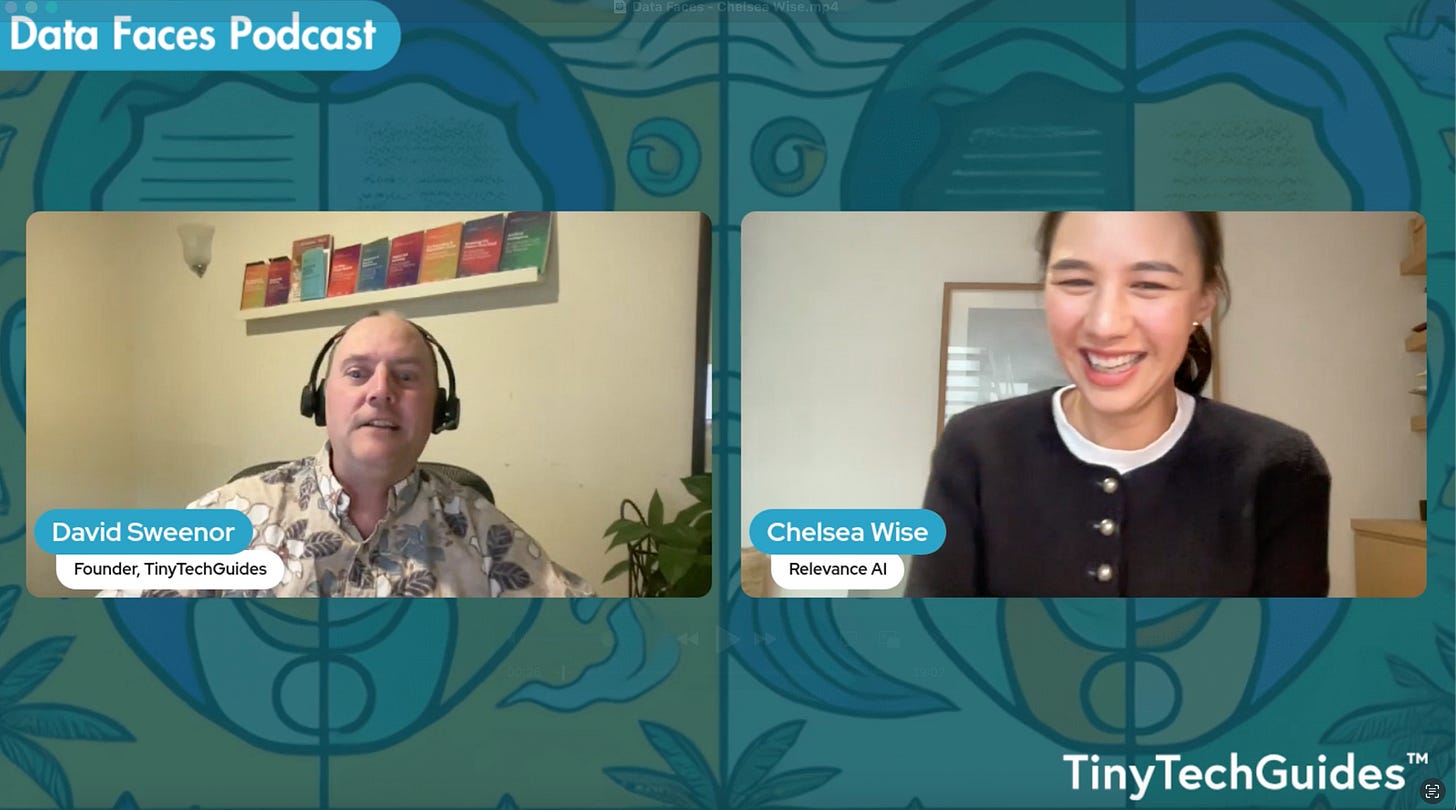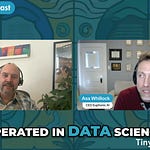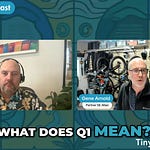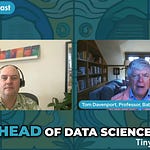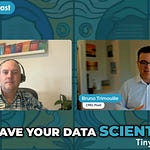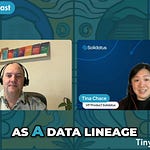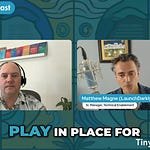Listen now on YouTube | Spotify | Apple Podcasts
Why the oldest person on the team won the AI hackathon
Chelsea Wise didn't expect to win anything. At Relevance AI's internal hackathon, she was the oldest person on her team, working alongside engineers barely out of college. She'd never competed in a hackathon before. She doesn't write code.
Yet her team won "Most Original Agent." Not most technical. Not people's choice. Most original.
Here's why this matters for every marketing leader watching AI agents reshape their industry. The winning advantage wasn't technical skill or AI expertise. It was Chelsea bringing a marketer's perspective to a room full of engineers and asking the right question: "How can I create world-class tutorials and documentation when I barely have headcount?"
About Chelsea Wise
Chelsea is a go-to-market specialist at Relevance AI, where they build and deploy AI agents across multiple use cases. She holds a PhD in marketing, consumer behavior, and choice modeling, and has spent the past decade in startups from series C through series B rounds. She also teaches AI ethics and data algorithms as an adjunct professor at two top universities. In our conversation, we explore why learning and development is the most underestimated change from AI agents, how to build trust through peer-to-peer learning, real use cases that deliver immediate value, and the critical thinking skills that become more valuable as AI handles routine tasks.
The biggest change from AI agents isn't automation. It's how marketing teams need to learn from each other.
What Stanford research reveals about your marketing team
Stanford researchers published one of the first studies examining how AI agents will change knowledge work. They didn't ask whether marketers will be replaced. They studied specific tasks within marketing jobs.
The findings contradict most headlines you've read. AI agents excel at analyzing information and documenting processes. Your content audits, competitive analysis, and campaign reporting can happen faster. But speed isn't the story.
"The Stanford study is really interesting because it actually doesn't break down, like, it doesn't take a marketer and like, says replaceable, yes, no, it takes components of the tasks. It's the studies at the task level of the jobs."
— Chelsea Wise, Go-to-Market Specialist, Relevance AI
The study found something unexpected about AI resistance. Job security wasn't driving the pushback. People don't trust what they don't understand. Chelsea discovered this firsthand: "People can't trust something if they don't understand it."
After 18 months of using AI agents, Chelsea has learned which tasks work and which don't. She finds them "pretty good at analyzing information, documenting information, generating change logs, and product communications." Her secret weapon? Fifty engineers who provide immediate feedback on every output. This validation loop builds confidence over time.
The Stanford study revealed which marketing skills become more valuable as AI handles routine analysis. Communication with your team. Organizing and planning work. Training others. These human capabilities matter more, not less.
Why compliance training holds the key to AI adoption
Chelsea stumbled onto something marketing leaders miss while rushing to implement AI tools. She had to complete mandatory compliance training for her university teaching role. The standard approach? Click through videos alone at your desk.
Instead, Chelsea developed cohort-based learning where teams tackle AI together through structured conversations. Her internal hackathon proved this approach works. Mixed teams of marketers and engineers produced breakthrough results in a single day.
"One of the most underestimated change, or one of the little hacks that I've just stumbled upon recently... it's learning and development... cohort based learning, okay, learning together, not clicking on little videos, but actually getting together and slowing down and having conversations."
— Chelsea Wise, Go-to-Market Specialist, Relevance AI
The hackathon-winning solution automated the process of turning feature updates into narrated tutorial videos. But the breakthrough came from collaboration between the oldest and youngest team members. "I'm not them, they're not me. But together, we made something really, really cool."
This isn't optional for marketing leaders. Chelsea makes this clear: you must carve out dedicated time for mixed-team experimentation. "Leaders need to really carve out time... hosting a hackathon where people just play with tools, to see it, to apply it, to think it can really unlock ideas and energy."
"I think leaders need to really carve out time. What we do have now is our office in downtown. It's a big warehouse... customers come to us just to have an away day. And again, it sounds so corny, but you need to sometimes step away, carve out time and to learn from others."
— Chelsea Wise, Go-to-Market Specialist, Relevance AI
Start with spreadsheets, not strategy
LinkedIn is full of posts claiming "this 43-agent team can replace your entire marketing function." Chelsea calls this "click farming" that damages AI adoption. These replacement narratives hurt enterprise organizations that need practical starting points.
"There's definitely something that does them a disservice, and that's people on LinkedIn or whatnot with copy that says this 43 agent team can make you... With this team, you can fire your CEO to CMO tomorrow... It's click farming. It does its job in terms of getting the clicks and the attention, but it does a real disservice to people."
— Chelsea Wise, Go-to-Market Specialist, Relevance AI
Chelsea's most powerful use case involved screening over 2,000 bootcamp applicants. She needed to evaluate them across multiple dimensions: experience level, motivations, company type, and fit for cohort-based learning. Doing this manually would have meant skimming LinkedIn profiles and making snap judgments.
Instead, she built an AI workflow that enriched her applicant spreadsheet data. The system flagged high-fit candidates based on criteria she defined. The results surprised her. She discovered highly qualified people "at no-name companies" with "non-conventional signals" who became ideal participants.
"Again, using an agent... honestly, that workflow was phenomenal. It didn't auto make the decision for me that is still human, but it really superpowered the way in which I could, like, do this research and do it better than a human could have ever done that."
— Chelsea Wise, Go-to-Market Specialist, Relevance AI
"Most work happens in emails, in spreadsheets, and in Slack," Chelsea notes. Her change log generator, tutorial automation, and applicant screening all enhance existing workflows. These unglamorous use cases deliver immediate value because they solve real problems marketing teams face daily.
Look at your three most spreadsheet-heavy marketing processes. Where do you currently do multi-dimensional analysis manually? Where do you need to evaluate qualitative data at scale? These are your starting points.
The questions that matter more than the technology
Teaching AI ethics to executive MBAs, Chelsea emphasizes one concept above all others. Don't ask whether AI outputs are right or wrong. Ask what's missing.
"Probably the biggest aha moment when I'm, like, teaching the slides... the aha moment that many people kind of have, and they're like, Oh, I never thought about that... just asking what's omitted from this analysis, not even if it's right or wrong... just asking, like, what information is included, and therefore, what conclusions can we make from that?"
— Chelsea Wise, Go-to-Market Specialist, Relevance AI
For marketing leaders, this means asking what market segments, customer voices, or competitive insights might be missing from AI-generated outputs. What assumptions did the AI make? What data sources did it exclude?
Human critical thinking becomes more valuable as AI handles analytical tasks, not less. Chelsea puts it directly: "You can't train that muscle in your brain—the LLM is not necessarily going to train it for you. You got to train it in your own head."
This requires validation loops. Chelsea's approach with her engineering team provides the model. Identify subject matter experts who can quickly evaluate AI outputs. For marketing, this means senior practitioners reviewing competitive analysis, customer insights, or campaign strategies generated by AI agents.
Also consider the second and third-order implications for how you run your business. This isn't about hiring an AI ops manager immediately. Have conversations about how AI agents will change team structure, skill requirements, and decision-making processes over time.
What happens next
The competitive advantage won't come from the AI tools themselves. Your competitors will access the same technology. The advantage comes from how quickly your team learns to work with these tools, how thoughtfully you integrate them into existing workflows, and how effectively you maintain human judgment throughout the process.
"We need our A players. We need our expertise more than ever before, and the role of critical thinking and all of that... you can't train that muscle in your brain like the LLM, not necessarily going to train it for you. You got to train in your own head."
— Chelsea Wise, Go-to-Market Specialist, Relevance AI
Chelsea's hackathon experience proves that the "oldest person on the team" working with the "youngest" can yield breakthrough results. The question isn't whether AI will change marketing. The question is whether you'll lead that change or react to it.
Marketing leaders who succeed will blend human insight with AI capability through thoughtful integration, peer learning, and maintained critical thinking. Not through wholesale replacement, but through strategic enhancement of what already works.
The future belongs to teams that learn together, start with unglamorous problems, and never stop asking what's missing from the analysis.
If you’re interested in Dr. Wise’s bootcamp, here’s the link: https://relevanceai.com/ai-ops-bootcamp
Here are the papers referenced:
Based on insights from Chelsea Wise, GTM expert at Relevance AI, featured on the Data Faces Podcast.
About David Sweenor
David Sweenor is an AI, generative AI, and product marketing expert. He brings this expertise to the forefront as the founder of TinyTechGuides and host of the Data Faces podcast. A recognized top 25 analytics thought leader and international speaker, David specializes in practical business applications of artificial intelligence and advanced analytics.
Books
Artificial Intelligence: An Executive Guide to Make AI Work for Your Business
Generative AI Business Applications: An Executive Guide with Real-Life Examples and Case Studies
The Generative AI Practitioner's Guide: How to Apply LLM Patterns for Enterprise Applications
The CIO's Guide to Adopting Generative AI: Five Keys to Success
Modern B2B Marketing: A Practitioner's Guide to Marketing Excellence
The PMM's Prompt Playbook: Mastering Generative AI for B2B Marketing Success
With over 25 years of hands-on experience implementing AI and analytics solutions, David has supported organizations including Alation, Alteryx, TIBCO, SAS, IBM, Dell, and Quest. His work spans marketing leadership, analytics implementation, and specialized expertise in AI, machine learning, data science, IoT, and business intelligence.
David holds several patents and consistently delivers insights that bridge technical capabilities with business value.
Follow David on Twitter @DavidSweenor and connect with him on LinkedIn.
Podcast Highlights - Key Takeaways from the Conversation
[0:40] Chelsea's unconventional career path "My name is Chelsea, and, yes, I do stuff. I love that. So could you just tell us a little bit about you yourself, and then your company and what you're doing over there?"
[3:15] The academic foundation behind AI expertise "I do have a degree. I'm like a accidental startup technology consultant person, but my first career was as an academic. So I'm trained in those areas, formally trained... I studied under one of the world class, Jordan louvier, one of the world the grandfather of choice modeling."
[5:25] The most underestimated change from AI agents "One of the most underestimated change, or one of the little hacks that I've just stumbled upon recently... it's learning and development... cohort based learning, okay, learning together, not clicking on little videos, but actually getting together and slowing down and having conversations."
[8:50] Why the Stanford study changes everything "The Stanford study is really interesting because it actually doesn't break down, like, it doesn't take a marketer and like, says replaceable, yes, no, it takes components of the tasks. It's the studies at the task level of the jobs."
[11:18] The trust gap that's holding teams back "The first insight that came out of it was that it wasn't job security or insecurity, it was just trust and understanding. And people can't trust something if they don't understand it."
[22:43] Why leaders must carve out time for AI experimentation "I think leaders need to really carve out time... hosting a hackathon where people just play with tools, to see it, to apply it, to think it can really unlock ideas and energy."
[25:29] The biggest misconception hurting AI adoption "There's definitely something that does them a disservice, and that's people on LinkedIn or whatnot with copy that says this 43 agent team can make you... It's click farming... but it does a real disservice to people."
[29:46] The spreadsheet workflow that changed everything "Again, using an agent... honestly, that workflow, it was phenomenal. It didn't auto make the decision for me that is still human, but it really super powered the way in which I could, like, do this research and do it better than a human could have ever done that."
[36:05] The critical thinking question that matters most "Probably the biggest aha moment when I'm, like, teaching the slides... just asking what's omitted from this analysis, not even if it's right or wrong... just asking, like, what information is included, and therefore, what conclusions can we make from that?"
[38:08] Why human expertise becomes more valuable, not less "We need our A players. We need our expertise more than ever before, and the role of critical thinking... you can't train that muscle in your brain like the LLM not necessarily going to train it for you. You got to train it in your own head."


